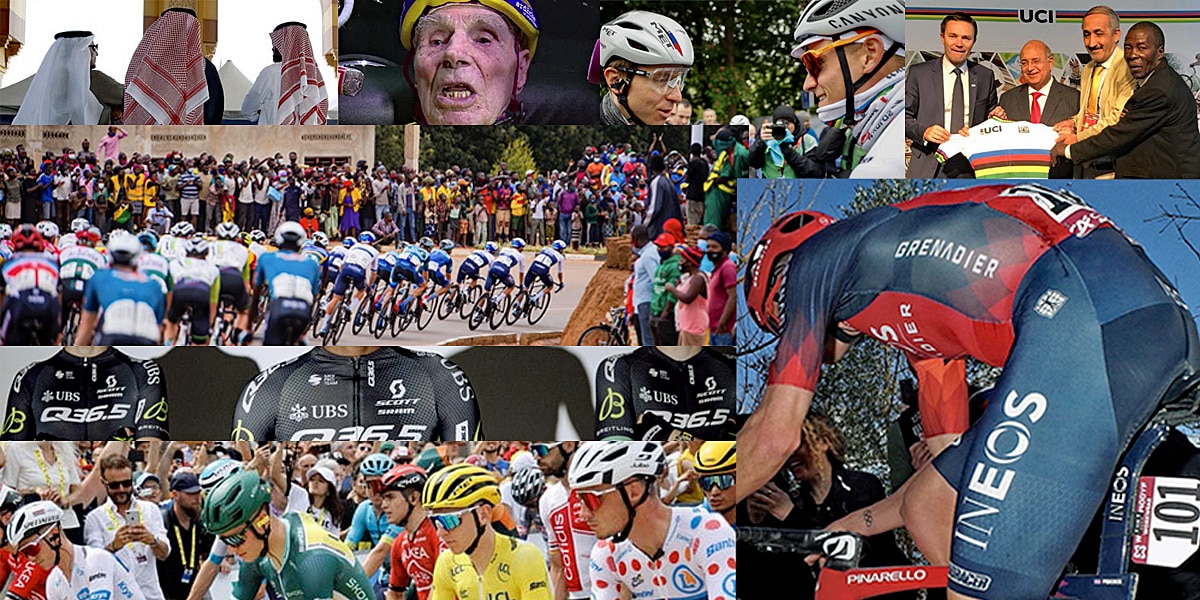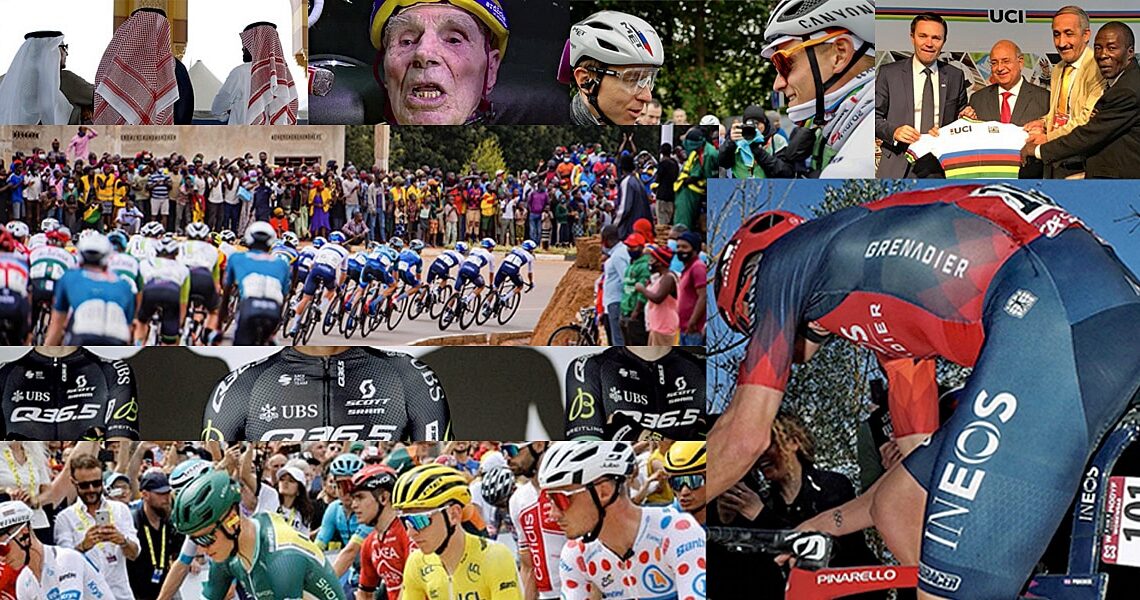
In this week’s AIRmail newsletter, The Outer Line takes an in-depth look at trending cycling news: New form of athlete “union”, football changes and potential effect on cycling, Pidcock saga finally ends; Rwanda shifting sportswashing focus…
# Catch up on pro cycling – and its context within the broader world of sports – with AIRmail … Analysis, Insight and Reflections from The Outer Line. You can subscribe to AIRmail here, and check out The Outer Line’s extensive library of articles on the governance and economics of cycling here. #
Key Takeaways:
- Are “Agent-Improvised” Athlete Unions Coming?
- Euro Football Changes: Implications for Cycling
- The Pidcock Saga Finally Ends
- Is Rwanda Shifting Its Sports-Washing Focus to Motorsports?
- Exercise is the Best Way to a Long Life

Salary cap – Rider union
Pro cycling’s stakeholders may be looking to other franchise sports like the NFL and NBA for cues regarding a potential WorldTour salary cap model, but a recent power play in global soccer may be changing the landscape. Bruin Capital recently merged three prominent European athlete agent and coach representation/management firm acquisitions, with a fourth based in UAE likely to be closed soon. The U.S. investment giant has named its new venture “AS1” – a play on “as one” – and will essentially coordinate and control the contract strategies and negotiations for upwards of 300 players and coaches across 35 professional football leagues. And via a legally separate entity in the Bruin portfolio called Legion Partners (to avoid conflicts of interest), it will also hold equity in several pro clubs. While not the largest representation firm in soccer yet, the speed by which Bruin executed its strategy shows that a well-capitalized investor can assemble a vast number of athletes within a sport under its umbrella with potentially the same impact as a hostile business takeover. At some level, such an organization could potentially act like an athlete’s union by way of representation majority, independently of any nominal association that may exist in the sport, like pro cycling’s CPA, to steer major governance decisions and strategies.

Pogačar and Van der Poel both have long contracts
Informally, super-agents have already been a significant disruptor in U.S. leagues; Rich Paul and Scott Boras have essentially forced franchises to change coaches, acquire or trade players, or even completely change market and media strategy to finance elite player contracts, some of which have approached $1 billion – a figure that is similar to some Euro football league transfers. IMG (now part of Endeavor) has many of professional tennis’ current stars under its representation umbrella – which potentially gives it leverage regarding tournament appearances or to impact fan and media factors which affect the sport’s economics. Given the outsized power that pro cycling’s super agents have wielded over the last decade – steering the fortunes of their riders but also the teams which sign or lose those assets – it’s not a stretch to ponder a future when a similar type of aggregation strategy (like AS1) could essentially circumvent the CPA and the AIOC teams association to force change (although ASO might still hold the upper hand, via the Tour de France). The reported increase in men’s WT contract values for 2025 may be the result of deft agent negotiations, but could agent influence reach a tipping point when the entire sport’s economics are one day steered by a party that doesn’t even need a seat at a governance table?

Pidcock on his way… eventually
After months of speculation and multiple public verbal spats, Ineos-Grenadiers and its multi-discipline star, Tom Pidcock, finally announced they were parting ways last week. Shortly thereafter, Pidcock officially announced that he was joining the small, second-division Q36.5 team through the end of the 2027 season. The sight of a top British star essentially forcing his way out of the flagship British team illustrates just how far the former super-team has fallen from its hey-day between 2012 and 2019 – when it took seven out of eight Tours de France and was the desired team for any and all UK-developed talent and many other A-list stars.

It must be a good move for Q36.5
The Q36.5 team finished 25th in the UCI Points Rankings in 2024, and seventh amongst second-division teams – by all measures one of the weakest teams to regularly attend WorldTour races, since it was built out of the ashes of the defunct Qhubeka NextHash team by South African billionaire Ivan Glasenberg and long-time manager Doug Ryder prior to the 2023 season. Factoring for the relatively weak roster behind Pidcock, Q36.5 will have to rely on wildcard invitations for the 2025 season, which means Pidcock’s presence at the biggest races will be in some doubt. For example, while the larger 25-team start lists at WorldTour one-day races will likely accommodate the team, the smaller 22-team Grand Tours – which typically have only two discretionary invitations – may not find room for them. This means that Pidcock, one of the sport’s most exciting stars, will be crossing his fingers that his team’s backroom negotiation skills gain him entry to any three-week races (the Giro d’Italia might even be a stretch). Perhaps most significantly, he is likely to be absent from the Tour de France – which has generally offered its wildcard slots to only the highest-performing and/or French-based, second-division teams.

Pidcock leaving not bad for Ineos
Pidcock’s exit isn’t necessarily all bad for Ineos; in fact, it could actually presage a few silver linings for the team’s potential path forward. For example, even if they had to partially subsidize Pidcock’s new deal at Q36.5 due to his existing contract guarantees and transfer obligations, getting the majority of his massive contract (rumored to be upwards of £5 million per season) off their books gives them new-found flexibility to offer more for the next potential star who comes on the market – similar to the effect of Maxime Gils leaving Lotto. Geraint Thomas and Egan Bernal’s deals expire over the next two seasons and will free up even more capital and potentially present the team as an appealing landing spot for established champions like Remco Evenepoel (whose long-term current team sponsor future is unclear), or for super-talented but long-suffering domestiques like João Almeida or Juan Ayuso (should they finally tire of water-carrier duties). The short-term pain of parting with a high-profile homegrown young star could actually be an important step forward for the team, as it continues to try to reinvent itself in the sport’s new balance of power.

Saudi Arabia’s sports strategy
There were further reports and discussion this week regarding the pace and scale at which Saudi Arabia is attempting to build its presence in international sport. Play the Game, the Danish-based sports “think tank,” in an extensive new report, details the intricate networks and personal relationships behind Saudi Arabia’s sports strategy. The report also highlights the various governance challenges and potential conflicts of interest that state actors like Saudi Arabia can threaten, and how that may impact the integrity of international sport. “Beneath the surface of these numbers lies a story of how Saudi Arabia is using sports to project soft power, build strategic alliances, and reshape its global image while making the world forget about the Kingdom’s severe human rights atrocities.”

The bottom line? “Move or die” – The Hour Record holder at 100
Doctors, sports physiologists and athletes have argued forever over how to predict how long a person may live, but now an article in Outside magazine suggests that one variable stands out above all others. Data from a National Health and Nutrition Examination Survey study of 3,600 people between the ages of 50 and 80 were tracked according to all of the standard life expectancy variables – age, gender, BMI, race, education, alcohol, smoking, preexisting health conditions and so on. However, the very best single predictor for how to live longer was simply the level of physical activity and exercise. The bottom line? “Move or die.”

Worlds in Rwanda or F1?
Rwanda is back into sporting news for the first time in months – and not for its ongoing preparation struggles for hosting the 2025 UCI World Championships. Reportedly, the country is in the running to potentially host a Formula 1 race for the first time in Africa in over 30 years. The proposed F1 Rwanda stop would be in the capital, Kigali, and we are likely to learn more when the formal bid is presented to FIA and the motorsport’s organizing owner, Liberty Media. Rwanda’s bid follows South Africa’s ongoing efforts to bring F1 back to its Kyalami circuit, near Johannesburg, which hosted twenty Grand Prix races through 1993. Rwanda’s interest in hosting F1 is not new information per se; it first broke in August, with legendary driver Lewis Hamilton consulting to Rwanda’s then-exploratory bid team. Much like the upcoming UCI Worlds, an international sporting event like F1 seeks to boost the tourism economy, find a global stage on which to sell a flattering and investment-ready image of the host nation, and can create a lasting inspirational impression to boost national pride and future athlete development.

No lack of fans in Rwanda
However – much like the capital needed to host a cycling world championship – there are infrastructure and planning investments which can quickly derail these efforts. Aside from recent evidence that big sporting events don’t deliver promised long-term economic returns, F1 commands a $35 million annual race licensing fee (and climbing) for its scarce calendar spots – and there are even greater costs to build race venue infrastructure. The Kyalami track is an advantage, but South Africa has persistent political, civil, and economic instabilities. In contrast, Rwanda has political-social stability due to President Paul Kagame’s three-decade reign, and a cash positive economy – apparently one capable of bidding for multi-year F1 licenses. However, Kagame’s notorious ironclad regime faces well-founded human rights abuses, journalistic suppression, and sportswashing accusations. In addition, its cash-rich current situation is reportedly due to the piracy of rare earth minerals and precious metals from its civil war-torn neighbor, Democratic Republic of Congo – where it allegedly trains and arms rebel groups in exchange for the illicit mining. And – as we know from pro cycling and international news sources – Rwanda has faced significant difficulties preparing for just the UCI Worlds despite having over four years lead time. Hence, one might ask if the shift in Rwandan focus to motorsports is the result of its relative recent decline in cycling, or if the higher-value marketing with F1 is simply a better option for Kagame’s nation-building and economic development agendas.

Rwanda: Preparing for the UCI Worlds
# Catch up on pro cycling – and its context within the broader world of sports – with AIRmail … Analysis, Insight and Reflections from The Outer Line. You can subscribe to AIRmail here, and check out The Outer Line’s extensive library of articles on the governance and economics of cycling here. #
The post Athlete Union, Football Effect on Cycling, Pidcock Saga, Rwanda Sportswashing Focus … appeared first on PezCycling News.




